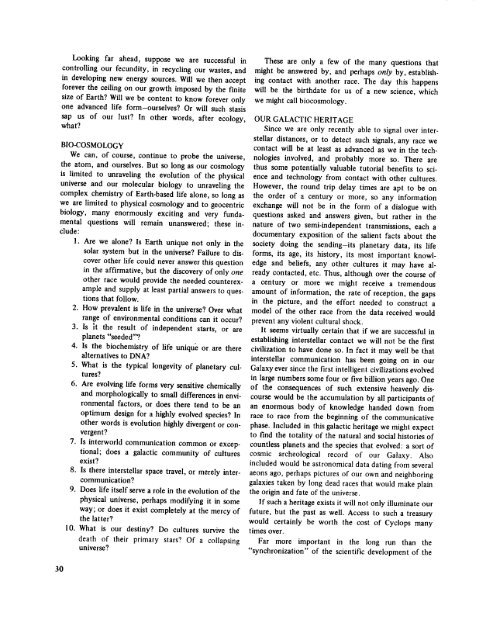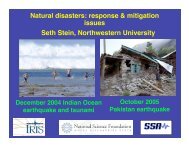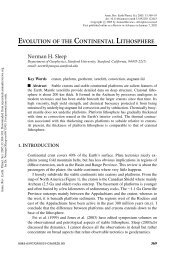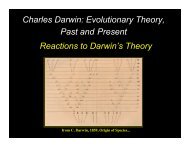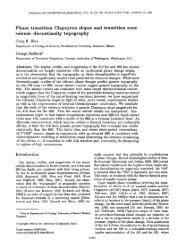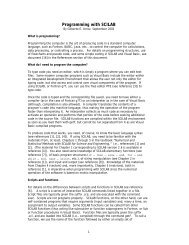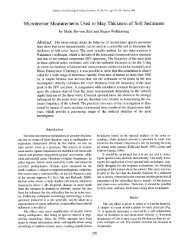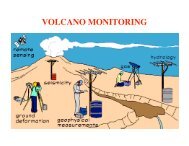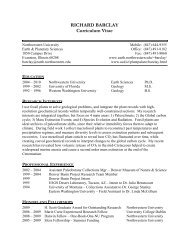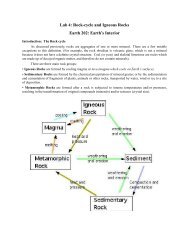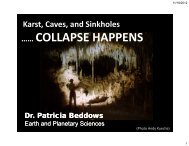Project Cyclops, A Design... - Department of Earth and Planetary ...
Project Cyclops, A Design... - Department of Earth and Planetary ...
Project Cyclops, A Design... - Department of Earth and Planetary ...
Create successful ePaper yourself
Turn your PDF publications into a flip-book with our unique Google optimized e-Paper software.
Lookingfar ahead,supposewe aresuccessful in<br />
controllingour fecundity, in recycling our wastes, <strong>and</strong><br />
in developing new energy sources. Will we then accept<br />
forever the ceiling on our growth imposed by the finite<br />
size <strong>of</strong> <strong>Earth</strong>? Will we be content to know forever only<br />
one advanced life form-ourselves? Or will such stasis<br />
sap us <strong>of</strong> our lust? In other words, after ecology,<br />
what?<br />
BIO-COSMOLOGY<br />
We can, <strong>of</strong> course, continue to probe the universe,<br />
the atom, <strong>and</strong> ourselves. But so long as our cosmology<br />
is limited to unraveling the evolution <strong>of</strong> the physical<br />
universe <strong>and</strong> our molecular biology to unraveling the<br />
complex chemistry <strong>of</strong> <strong>Earth</strong>-based life alone, so long as<br />
we are limited to physical cosmology <strong>and</strong> to geocentric<br />
biology, many enormously exciting <strong>and</strong> very fundamental<br />
questions will remain unanswered; these include:<br />
1. Are we alone? Is <strong>Earth</strong> unique not only in the<br />
solar system but in the universe? Failure to dis.<br />
cover other life could never answer this question<br />
in the affirmative, but the discovery <strong>of</strong> only one<br />
other race would provide the needed counterexample<br />
<strong>and</strong> supply at least partial answers to questions<br />
that follow.<br />
2. How prevalent is life in the universe? Over what<br />
range <strong>of</strong> environmental conditions can it occur?<br />
3. Is |t the result <strong>of</strong> independent starts, or are<br />
planets<br />
"seeded"?<br />
4. Is the biochemistry <strong>of</strong> life unique or are there<br />
alternatives to DNA?<br />
5. What is the typical longevity <strong>of</strong> planetary cultures?<br />
6. Are evolving life forms very sensitive chemically<br />
<strong>and</strong> morphologically to small differences in environmental<br />
factors, or does there tend to be an<br />
optimum design for a highly evolved species? In<br />
other words is evolution highly divergent or convergent?<br />
7. Is interworld communication common or exceptional;<br />
does a galactic community <strong>of</strong> cultures<br />
exist?<br />
8. Is there interstellar space travel, or merely intercommunication?<br />
9. Does life itself serve a role in the evolution <strong>of</strong> the<br />
physical universe, perhaps modifying it in some<br />
way; or does it exist completely at the mercy <strong>of</strong><br />
the latter?<br />
10. What is our destiny? Do cultures survive the<br />
death <strong>of</strong> their primary stars? Of a collapsing<br />
universe?<br />
These are only a few <strong>of</strong> the many questions that<br />
might be answered by, <strong>and</strong> perhaps only by, establishing<br />
contact with another race. The day this happens<br />
will be the birthdate for us <strong>of</strong> a new science, which<br />
we might<br />
call biocosmology.<br />
OUR GALACTIC HERITAGE<br />
Since we are only recently able to signal over interstellar<br />
distances, or to detect such signals, any race we<br />
contact will be at least as advanced as we in the technologies<br />
involved, <strong>and</strong> probably mote so. There are<br />
thus some potentially valuable tutorial benefits to science<br />
<strong>and</strong> technology from contact with other cultures.<br />
However, the round trip delay times are apt to be on<br />
the order <strong>of</strong> a century or more, so any information<br />
exchange will not be in the form <strong>of</strong> a dialogue with<br />
questions asked <strong>and</strong> answers given, but rather in the<br />
nature <strong>of</strong> two semi-independent transmissions, each a<br />
documentary exposition <strong>of</strong> the salient facts about the<br />
society doing the sending-its planetary data, its life<br />
forms, its age, its history, its most important knowledge<br />
<strong>and</strong> beliefs, any other cultures it may have already<br />
contacted, etc. Thus, although over the course <strong>of</strong><br />
a century or more we might receive a tremendous<br />
amount <strong>of</strong> information, the rate <strong>of</strong> reception, the gaps<br />
in the picture, <strong>and</strong> the effort needed to construct a<br />
model <strong>of</strong> the other race from the data received would<br />
prevent any violent cultural shock.<br />
It seems virtually certain that if we are successful in<br />
establishing interstellar contact we will not be the first<br />
civilization to have done so. In fact it may well be that<br />
interstellar communication has been going on in our<br />
Galaxy ever since the first intelligent civilizations evolved<br />
in large numbers some four or five billion years ago. One<br />
<strong>of</strong> the consequences <strong>of</strong> such extensive heavenly discourse<br />
would be the accumulation by all participants <strong>of</strong><br />
an enormous body <strong>of</strong> knowledge h<strong>and</strong>ed down from<br />
race to race from the beginning <strong>of</strong> the communicative<br />
phase. Included in this galactic heritage we might expect<br />
to find the totality <strong>of</strong> the natural <strong>and</strong> social histories <strong>of</strong><br />
countless planets <strong>and</strong> the species that evolved: a sort <strong>of</strong><br />
cosmic archeological record <strong>of</strong> our Galaxy. Also<br />
included would be astronomical data dating from several<br />
aeons ago, perhaps pictures <strong>of</strong> our own <strong>and</strong> neighboring<br />
galaxies taken by long dead races that would make plain<br />
the origin <strong>and</strong> fate<br />
<strong>of</strong> the universe.<br />
If such a heritage exists it will not only illuminate our<br />
future, but the past as well. Access to such a treasury<br />
would certainly be worth the cost <strong>of</strong> <strong>Cyclops</strong> many<br />
times over.<br />
Far more important in the long run than the<br />
"synchronization" <strong>of</strong> the scientific development <strong>of</strong> the<br />
3O


